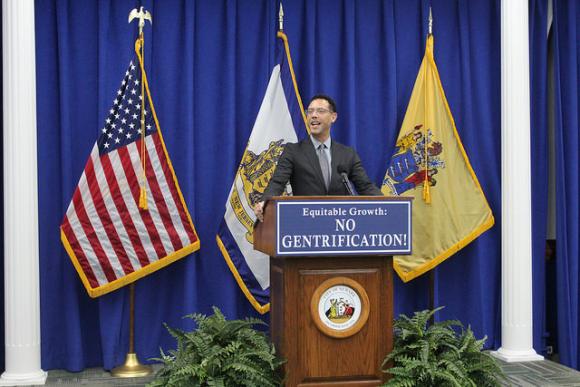
Rutgers Law Professor David Troutt speaks at the announcement of the formation of an Equitable Growth Advisory Commission in the City of Newark.
In an effort to protect Newark residents from being priced out of existing housing as the city enjoys a surge in development, the City of Newark announced the creation of an Equitable Growth Advisory Commission, an idea first formally introduced by Rutgers Law School Professor David Troutt, based on research conducted by the Rutgers Center on Law, Inequality & Metropolitan Equity (CLiME).
The commission, which was announced at a news conference at Newark City Hall on December 6, will begin next year and will be made up of representatives from non-profit organizations, businesses, and higher education to advise the city on issues including land use and housing law.
Troutt was one of the speakers at the news conference where the commission was announced. "My hope is we will build an institution for the City of Newark to follow, and other cities, that works as an effective steward for people who are typically the last to be thought of when redevelopment projects are redeveloped," said Troutt. "I'm quite hopeful."
Troutt and CLiME conducted an eight-month study on housing in the City of Newark and analyzed how to best balance growth and development in the city with its housing needs. Based on data, Rutgers researchers provided recommendations on how to spread the benefits of economic growth to all wards and neighborhoods in Newark. The group’s goals focused on encouraging equitable development, reducing displacement risk for residents, increasing the capacity of existing agencies, improving upon existing initiatives, and becoming more child-centered.
The report’s findings were shared with the mayor and his executive staff in October 2017. The research project coincided with a meeting between Newark Mayor Ras Baraka and Rutgers University-Newark Chancellor Nancy Cantor, where Baraka sought faculty input on urban development in the city.
During his remarks, the mayor thanked Rutgers Newark for being “an undeniable partner with us in the city.” Troutt added that Chancellor Cantor was a strong supporter of the research and work conducted by Rutgers.
The city’s ordinance spelling out the formation of the commission said that Newark “faces a longstanding crisis of affordability in housing and research has shown that growing cities with affordability crises tend to displace the most vulnerable residents” and “the city is committed to an overall policy of equitable growth to ensure that the benefits of new development extend to all Newark residents of limited economic means.”
Baraka said the city had a chance to embrace the opportunities brought about by new development – including road improvements, restaurants, and housing – without “trampling on working-class people” by putting a comprehensive plan into place to protect the city’s most vulnerable residents. Besides the commission, the mayor said the city has an “inclusionary zoning ordinance” that requires any new housing that is over 30 units to make a percentage of those units affordable, in addition to other measures.
"This puts in place formal vehicles that will monitor the city's redevelopment efforts. (The Commission) is a cross-section of community stakeholders, who, collectively have community knowledge and expertise of vulnerable populations and can see the probable effects of initiatives and projects," said Troutt. "The commission has the capacity to talk to city officials to get more information on projects, to convene experts to talk about projects, offer feedback and better advise the mayor and administration."
Applications for people who want to serve on the new commission will be accepted at City Hall and city officials said they hope to have the new panel in place by the end of January.
“It’s a historic moment for Newark,” Troutt said. “Our primary recommendation was that the city receive help from a cross-sector of stakeholders. . . to convene a group of people who love and understand Newark and who appreciate the challenges of the city.”